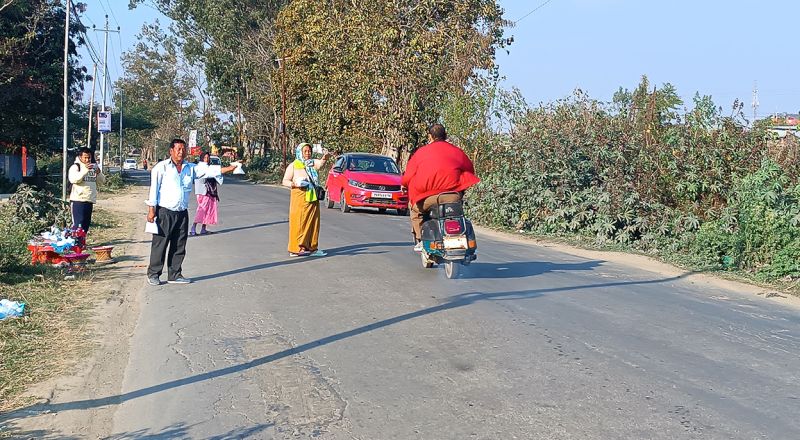Thoudam Landhoni tightly held a packet of candle and incense sticks in one hand as she waved with the other to stop vehicles amid the heavy traffic along the Langthabal-Heirangoithong road.
She, along with her husband and four of her relief camp inmates, had been toiling in the relentless Tuesday afternoon sun to make ends meet.
Forty-Seven-year-old Thoudam Landhoni hails from Churachandpur New Bazar and has been rendered homeless since the conflict erupted on 3 May. Since then, she has been seeking refuge in the relief camp at Phubala High School, Bishnupur district along with her husband Thoudam Nandabir (55) and their children.
Landhoni’s story is one among hundreds who are reeling under the burden of the conflict; hundreds of relief camp inmates have come out on the roads to sell similar products in various parts of the valley.
Some have even started door-to-door sales of their products while others use vehicles to conduct their businesses in several places.
 (PHOTO: IFP)
(PHOTO: IFP)
Driven by the fear of an uncertain future, she and her husband started to make candles, incense sticks and washing detergents to sell and provide for their family.
Her youngest daughter is appearing in the ongoing COHSEM class 12 exam while her 24-year-old son gave up studies and started working in a shop in Imphal to share the burden of the family.
Like a menacing dream which never stops, the ceaseless conflict turned her world upside down forcing her family to take on any livelihood means and start hustling.
Speaking to Imphal Free Press, Landhoni stated that she had been selling the relief camp products for nearly three months now.
“We have to make ends meet for our family and I am sure this is the story of all staying in relief camps,” she said.
She highlighted that she sold her gold earrings, which she had on during her escape from Churachandpur, to acquire the requisite materials for the products.
“An individual who had provided Yoga training at the relief camp taught us how to make the products but the important thing is we have no clue how to market the products, “she said.
She stated that she along with her husband and few of her friends at the camp decided to make and sell the products as daily financial demands kept staggering.
She added that fear of the wavering future coupled with immediate needs of the family pushed her to leave aside prejudice and take drastic measures.
“We need money to survive, to feed, to clothe and provide a better future for our children. We don’t know how long it will keep us afloat,” she said.
She informed that they were able to make around Rs 2,000-3,000 on a good day and made little to nothing on a bad day.
Meanwhile, 60-year-old Konthoujam Mema from Churachandpur Thengra Leirak, who is staying at a relief camp at KP College, Imphal West, along with her husband, also narrated a similar tale.
“Even though we escaped from Churachandpur, our horrors have just begun to take shape,” she said.
Mema along with two of her relief camp inmates also sell candles, incense sticks and washing detergents along the Hiyangthang-Meijrao road.
“We try to stop vehicles but we cannot simply force people to buy our products. Some buy out of sympathy while others have scolded us for doing so,” she said.
Both Landhoni and Mema questioned if the authorities had forgotten about the displaced while chasing their “political interests”.
Both appealed to the state government to swiftly sanction whatever amount they could so that they could restart their lives and move out of the relief camp.
“We cannot save up any feasible amount while looking out for our daily needs. We need the government’s support. How long are they going to keep us caged in the relief camp,” asked Landhoni.
Mema stated that the disregard for the displaced individuals reflected badly on the authorities’ part.
Both demanded the authorities concerned to swiftly address the plights of displaced individuals and expressed dissatisfaction over their failure to properly discuss the issue in the ongoing Manipur State Assembly session.
According to reports, the crisis displaced over 60,000 from both Kuki and Meitei communities and destroyed innumerable properties.
Following the eruption, the state government specifically dispensed numerous projects to aid the displaced people but their implementation is lacklustre while the question on sanction of funds for the displaced remains elusive.
Livelihood training programmes for the displaced came as shining beacons of hope for the victims but failure to provide a proper marketplace and necessary training to sell the products has pushed them to come out on the road.